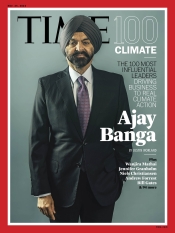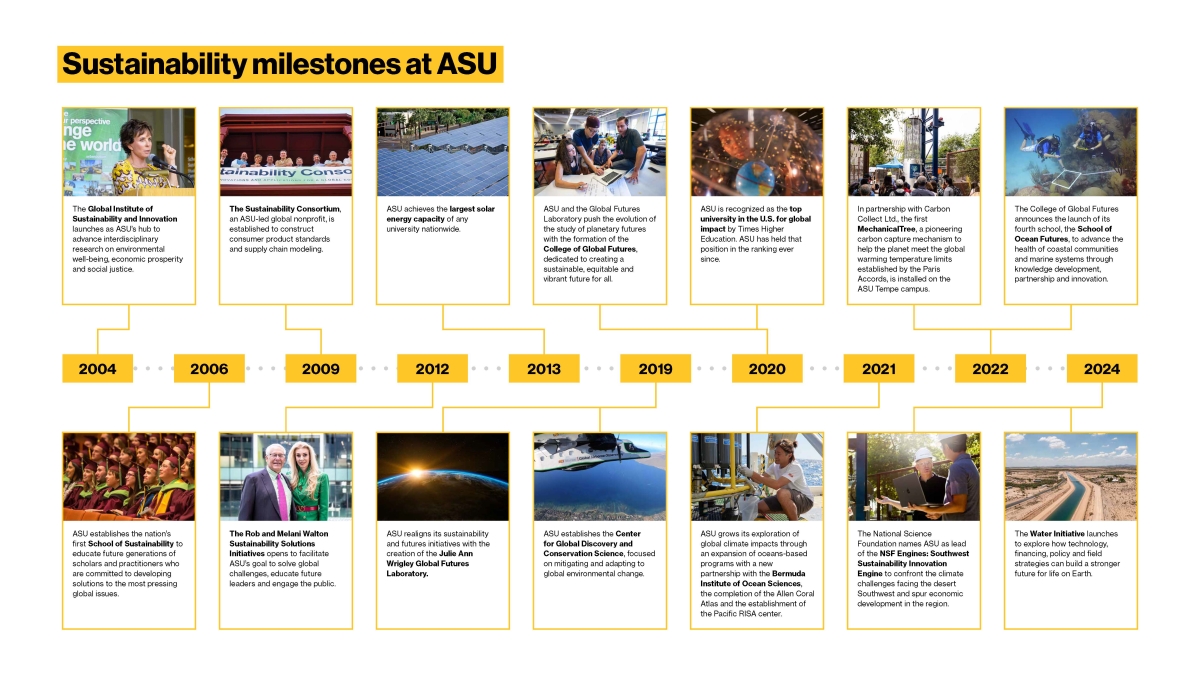ASU President Michael Crow named to TIME100 Climate list

Michael Crow is the first university president to be named to the TIME100 Climate list. He said the honor “is a welcome recognition of our university’s unique approach and impact.” Photo by Deanna Dent/ASU
Editor’s note: This story is featured in the 2024 year in review.
Arizona State University President Michael Crow has been named to the 2024 TIME100 Climate list of leaders and innovators driving real climate action.
The list includes leaders across a range of fields, from policy to business to education. TIME’s editors spent months vetting names from across the economy. They prioritized measurable, scalable achievements and recent action over commitments and announcements.
Crow is the first university president to be named to the TIME100 Climate list.
He is joined by such fellow honorees as World Bank President Ajay Banga; Claudia Sheinbaum, president of Mexico; Prince Harry, Duke of Sussex; Bill Gates, founder of Breakthrough Energy and TerraPower, among other enterprises; Jennifer Granholm, secretary of the U.S. Department of Energy; and Gila River Indian Community Gov. Stephen Roe Lewis. This is only the second time the magazine has released its climate list.
The ASU president said the TIME100 Climate honor “is a welcome recognition of our university’s unique approach and impact.”
“We’re not focused on ‘the sky is falling’ or scare tactics — fear only inspires shortsighted, ill-conceived actions,” said Crow, who had been previously honored by the magazine when it named him one of the 10 best college presidents in 2009.
“We’re instead focused on finding solutions and results to some of society’s biggest challenges.”
Crow’s nearly four-decade-long conviction that the world's leading universities are uniquely positioned — and have full responsibility — to lead in restoring and maintaining our relationship with the planet has driven many of his actions as a leader. His career path is full of early-stage actions and “firsts,” such as founding Columbia University's world-renowned Earth Institute (today part of Columbia's recently formed Climate School) and the Consortium for Science, Policy and Outcomes.
Since becoming president of ASU in 2002, he has transformed ASU into a powerhouse of climate-related action from Hawai’i to Bermuda, from deserts to rainforests and everywhere in between.
Among ASU’s recent innovations:
- This year, ASU became one of the first universities to require a three-credit sustainability course as part of students’ general-education curriculum, regardless of major.
- In February, the university launched the Circular Plastics Microfactory, a first-of-its-kind facility for recycling and remanufacturing plastics, which is expected to divert 550 tons from landfills annually.
- In April, ASU launched a state-of-the-art coral research and propagation facility — the largest coral nursery of its kind — in Hawai'i, with the aim of restoring 120 miles of reefs off the Big Island.
- The National Science Foundation selected ASU earlier this year to lead a multi-institution enterprise to confront climate change in the Southwest and spur economic development.
- The U.S. Department of Energy in 2023 named ASU the anchor institution for EPIXC (Electrified Processes for Industry without Carbon), the DOE’s seventh Clean Energy Manufacturing Innovation devoted to the challenge of fighting greenhouse gas emissions from industrial process heating.
- Two years ago, ASU was tapped to lead the multiyear Arizona Water Innovation Initiative to help secure the state’s water supply based on the university’s successful programs in water science, technology, management and law.
The university has been driving innovation in this area for decades. ASU established the nation's first School of Sustainability in 2006, two years after founding the Global Institute for Sustainability and Innovation, home to numerous programs tackling environmental crises.
Launched about a decade later, the Julie Ann Wrigley Global Futures Laboratory — comprising more than 70 units, centers, programs and initiatives, and five schools, including the School of Sustainability — is a first-of-its-kind entity modeled on the national labs and designed to serve as a “medical center for the planet.” Built on the diverse expertise of more than 855 scientists and scholars, it is the world's first comprehensive research and education institution dedicated to the empowerment of our planet and its systems.
ASU’s efforts to combat climate change can be seen all over its campuses. For example:
UN Sustainable Development Goals
In June, ASU became the only U.S. university in the top 10 in Times Higher Education's Impact ranking, which identifies global universities that excel in reaching the United Nations’ Sustainable Development Goals.
In that ranking, ASU was No. 1 in the “Life Below Water” Sustainable Development Goal, recognizing several recent developments:
The School of Ocean Futures, a school within the College of Global Futures, launched new undergraduate and graduate degrees that began in fall 2024.
On June 7, ASU celebrated 120 years of ocean research with ASU Bermuda Institute of Ocean Sciences, a long-running institution that merged with the Julie Ann Wrigley Global Futures Laboratory in 2021.
In Hawaiʻi, the reef restoration program ʻĀkoʻakoʻa — led by ASU and local partners — celebrated the official opening of its first coral reef facility in 2023.
ASU maintains an updated page describing the many ways it is addressing the 17 United Nations Sustainable Development Goals.
- The Walton Center for Planetary Health, which opened in 2022, became the eighth building at ASU to achieve a LEED platinum certification, the highest rating in the world’s most widely used green building rating system.
- Since 2004, ASU has installed 90 solar arrays, equivalent to 5,000 residential solar arrays, and received 217,984 MWh of electricity through large-scale solar and wind renewable-energy purchase agreements — enough to power approximately 17,000 Arizona homes for a year.
- In 2024, ASU added more electric-vehicle charging ports, purchased seven electric trucks, introduced an electric coach bus as one of the intercampus shuttles and introduced a program for staff to access electric vehicles.
- The university’s Zero Waste department has expanded its office compost program to universitywide deployment.
- Since fiscal year 2019, ASU has been carbon neutral for scope 1 and 2 emissions, achieved through energy efficiency, green construction, offsetting and renewable energy acquisition.
And ASU researchers have made groundbreaking discoveries in sustainability, including:
- Cody Friesen, an associate professor in the School for Engineering of Matter, Transport and Energy, who developed Zero Mass Water, a solar-powered technology that can generate water from sunlight and air.
- Klaus Lackner, research professor in the School of Sustainable Engineering and the Built Environment, pioneered the idea of direct air capture for the removal of carbon dioxide from the atmosphere and debuted the first “MechanicalTree” device on the Tempe campus in 2022.
- Bruce Rittman, Regents Professor in the School of Sustainable Engineering and the Built Environment, is part of a team that developed a new method that helps microorganisms destroy “forever chemicals” in water.
Crow said that sustainability is becoming an increasingly urgent topic to ensure a future in which humans and the planet thrive.
“We have less time to take action than we did yesterday, but we have more time than we will a year, a decade from now,” he said. “ASU is responding to this reality not with panic, but by prioritizing sustainability both in research and in the classroom.
“There is unbelievable potential in informed optimism and bold steps. There is power in moving forward, and that’s what ASU is doing.”
See the full list of honorees at time.com/time100-climate. The full 2024 TIME100 Climate list will be featured in the Nov. 25 issue of TIME and will be available on newsstands Nov. 15.
More Environment and sustainability

ASU team creates decision-making framework to improve conservation efficiency
Conserving the world’s ecosystems is a hard job — especially in times of climate change, large-scale landscape destruction and the sixth mass extinction. The job’s not made any easier by the fact…

Mapping the way to harvesting water from air
Earth’s atmosphere contains about 13 trillion tons of water.That’s a lot of water to draw upon to help people who are contending with drought, overtaxed rivers and shrinking aquifers.In fact,…

ASU researchers test environmental risks of tire emissions on Arizona highways
The Greater Phoenix area’s roadway grid system is the envy of urban planners everywhere, and the Arizona Department of Transportation, or ADOT, strives for…



